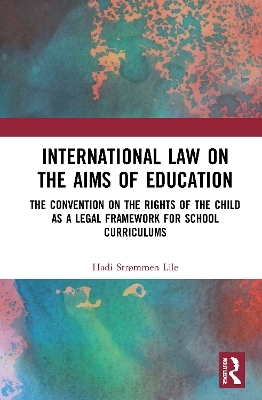
International Law on the Aims of Education
Routledge (Verlag)
978-0-367-35870-9 (ISBN)
The book adopts a traditional legal positivist approach to explore the scope and nature of international law on the aims of education. It is divided into three main questions: 1) What is international law and are the aims of education valid legal obligations? 2) What is the content and scope of these laws on the aims of education? 3) What are the obligations of authorities and teachers to respect and fulfil the law? The book is unique as the first book on international law dedicated separately to the aims of primary and secondary school education, not only focusing on human rights education.
This book will be of great interest for teacher students, scholars and post graduate students in the field of education. It will also appeal to legal scholars as well as policymakers.
Hadi Strømmen Lile is as an Associate Professor at Østfold University College. He has a PhD from the Law Faculty of University of Oslo.
Abbreviations
Preface
Chapter 1: Introduction
1.1 The Concept "International Law on the Aims of Education"
1.2 The Concept of "Education"
1.3 The first international provision
1.4 The most important human right of them all
1.5 CESCR article 13 (1)
1.6 The Convention on the Rights of the Child
1.6.1 CRC article 29 (1)
1.6.2 Overall objective of education
1.7 Rights and duties
1.8 Summary
Chapter 2: International Law and its Jurisprudence
2.1 Natural law v. legal positivism
2.2 What is international law
2.3 Good faith and ordinary meaning
2.3.1 Good faith
2.3.2 Ordinary meaning
2.4 Context
2.5 The Committee on the Rights of the Child (CtRC)
2.5.1 General Comments
2.5.2 Concluding Observations
2.5.3 Individual Complaint Jurisprudence
2.6 Other conventions and their treaty bodies
2.7 Object and Purpose
2.8 Legal validity
2.8.1 Effectiveness and legal validity
2.9 Summary and conclusions
Chapter 3: Individual Aims of Education
3.1 Personality
3.1.1 Will and duty
3.1.2 Human personality and sense of dignity
3.2 Talents
3.3 Mental abilities
3.3.1 Literacy
3.3.2 Numeracy
3.3.3 Critical thinking
3.4 Physical abilities
3.5 Individual v. Collective education aims
3.6 Summary and conclusions
Chapter 4: Human Rights Education
4.1 Respect for human rights
4.2 Human Rights Education as a concept of its own
4.3 Education ‘about’ human rights
4.4 Education ‘through’ human rights
4.5 Education ‘for’ human rights
4.6 Fundamental freedoms
4.7 The UN Charter
4.7.1 Peace Education
4.7.2 HRE based on the UN Charter
4.8 Warning
4.9 Geographical Relevance
4.10 Means in the fight against prejudice
4.11 Not Just a School Subject
4.12 Santa Claus human rights
4.13 Enforcement of human rights
4.14 Summary and conclusions
Chapter 5: Respect for Culture, Values and Civilisations
5.1 The concept of respect
5.2 "Parents"
5.3 Their own cultural identity
5.4 The right to language and mother tongue
5.5 The child’s own values
5.6 "national values"
5.7 Civilisations
5.8 Summary and conclusions
Chapter 6: Tolerance and Understanding
6.1 "responsible life in a free society"
6.2 "in the spirit of"
6.3 Understanding
6.4 Peace
6.5 Tolerance
6.6 Equality of sexes
6.7 Friendship
6.8 Peoples
6.9 Ethnic and national groups
6.10 Religious groups
6.11 Persons of indigenous origin
6.12 Cultural relativism
6.13 The balance between the letters "c" and "d"
6.14 Hate speech and freedom of expression
6.15 Summary and conclusions
Chapter 7: Respect for Nature
7.1 Climate change education
7.1.1 The rights of future generations
7.2 Biological diversity
7.3 Indigenous rights and protection of the environment
7.4 Summary and conclusions
Chapter 8: History Education
8.1 History education as an end in itself
8.2 History education as a means to eliminate prejudice and promote HRE
8.3 How history education should be taught
8.4 Denial of genocide
8.5 Summary and conclusions
Chapter 9: State Obligations of Conduct and Results
9.1 "States Parties agree […]"
9.2 Progressive realisation
9.3 Obligation of conduct v. result
9.3.1 Obligation of conduct
9.4 Minimum core result
9.4.1 How to measure the results
9.4.2 Priorities between aims
9.5 National Plan
9.6 Teachers
9.6.1 The duties of teachers
9.7 Curriculum Reform and textbooks
9.7.1 Textbooks
9.8 The mass media
9.8.1 The right to Internet
9.9 Summary and conclusions
Chapter 10: Concluding visionary last words
References
Books and articles
UN Documents
Case law
Other reports
Websites
| Erscheinungsdatum | 15.01.2021 |
|---|---|
| Verlagsort | London |
| Sprache | englisch |
| Maße | 156 x 234 mm |
| Gewicht | 453 g |
| Themenwelt | Recht / Steuern ► EU / Internationales Recht |
| Sozialwissenschaften ► Pädagogik ► Allgemeines / Lexika | |
| Sozialwissenschaften ► Pädagogik ► Bildungstheorie | |
| ISBN-10 | 0-367-35870-0 / 0367358700 |
| ISBN-13 | 978-0-367-35870-9 / 9780367358709 |
| Zustand | Neuware |
| Haben Sie eine Frage zum Produkt? |
aus dem Bereich


